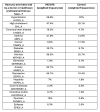Nightsong
Senior Member (Voting Rights)
Abstract:
Chronic fatigue syndrome or myalgic encephalomyelitis (CFS/ME) is a medical condition characterized by severe and prolonged fatigue that is not relieved by rest or attributed to any underlying medical or psychological condition. Individuals with CFS/ME are considered to have an increased risk of a wide range of comorbid conditions, including cardiovascular disease (CVD). The association between CFS/ME and CVD is not fully understood.
To determine the prevalence of CFS/ME in a sample population and examine its association with CVD. Weighted sample size data of 114,834 was analyzed from the 2021–2022 national health interview survey (NHIS). Information on sociodemographic factors, CVD risk factors, and history of CFS/ME and CVD were collected. Multivariable logistic regression model was used to determine the association between CFS/ME and CVD, adjusting for traditional CVD risk factors (age, sex, race, hypertension, diabetes, dyslipidemia, smoking, and body mass index (BMI). Median age of participants was 53 years, and majority of participants were female (53.9%). Prevalence of CFS/ME was 1.2%.
A history of CFS/ME was significantly associated with CVD (aOR 3.26, 95%CI 2.85, 3.72, p-value: <0.001) after adjusting for traditional CVD risk factors. A history of CFS/ME was independently associated with CVD after adjusting for traditional CVD risk factors. Patients with CFS/ME need close evaluation for CVD. Further studies are needed to better understand the relationship between CFS/ME and CVD.
Link | PDF (Nature Scientific Reports, January 2025, open access)
Chronic fatigue syndrome or myalgic encephalomyelitis (CFS/ME) is a medical condition characterized by severe and prolonged fatigue that is not relieved by rest or attributed to any underlying medical or psychological condition. Individuals with CFS/ME are considered to have an increased risk of a wide range of comorbid conditions, including cardiovascular disease (CVD). The association between CFS/ME and CVD is not fully understood.
To determine the prevalence of CFS/ME in a sample population and examine its association with CVD. Weighted sample size data of 114,834 was analyzed from the 2021–2022 national health interview survey (NHIS). Information on sociodemographic factors, CVD risk factors, and history of CFS/ME and CVD were collected. Multivariable logistic regression model was used to determine the association between CFS/ME and CVD, adjusting for traditional CVD risk factors (age, sex, race, hypertension, diabetes, dyslipidemia, smoking, and body mass index (BMI). Median age of participants was 53 years, and majority of participants were female (53.9%). Prevalence of CFS/ME was 1.2%.
A history of CFS/ME was significantly associated with CVD (aOR 3.26, 95%CI 2.85, 3.72, p-value: <0.001) after adjusting for traditional CVD risk factors. A history of CFS/ME was independently associated with CVD after adjusting for traditional CVD risk factors. Patients with CFS/ME need close evaluation for CVD. Further studies are needed to better understand the relationship between CFS/ME and CVD.
Link | PDF (Nature Scientific Reports, January 2025, open access)


